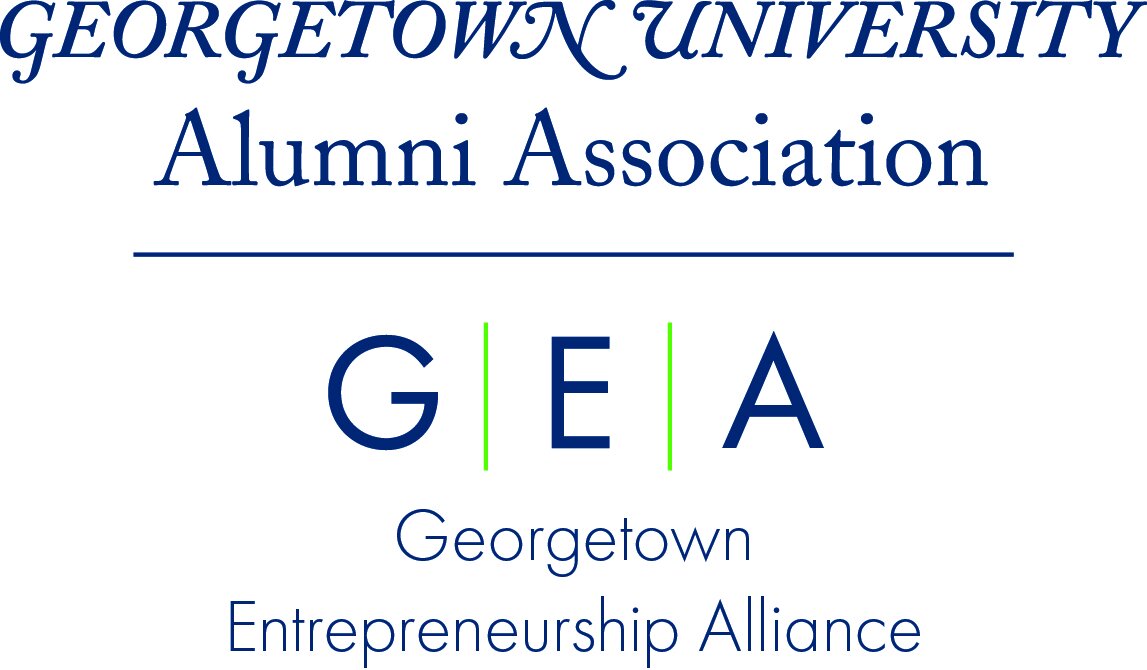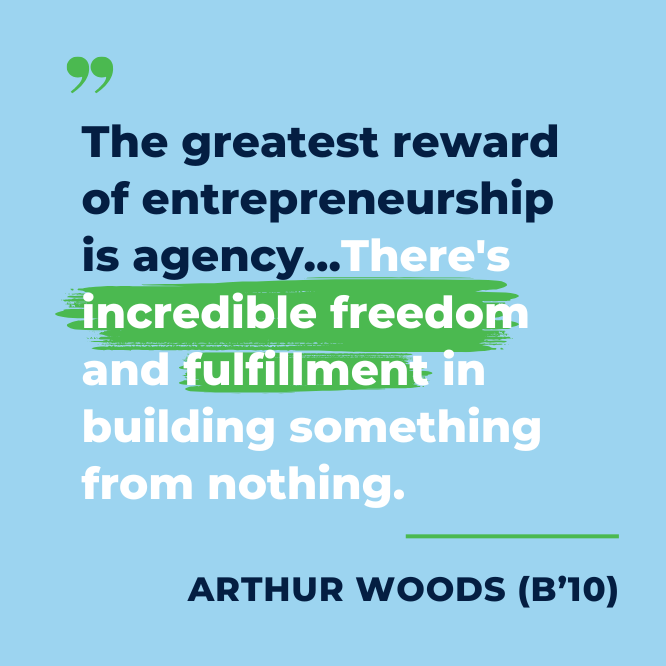Alumni Spotlight: Arthur Woods (B’10), Co-Founder of 1080 Ventures (and more!)
Interview by Genesis Ramirez (B’25)
Meet Arthur Woods (B’10), a social entrepreneur who co-founded 1080 Ventures (a modern venture studio that launches AI companies), Mathison (acquired by Changeforce), Imperative (acquired by Chronus), Out in Tech (the largest LTBTQ technology community with over 50,000 members), and The Compass Fellowship (a collegiate social entrepreneurial fellowship that was launched at Georgetown). Arthur was named to Forbes 30 Under 30, has delivered 3 TEDx talks, and wrote the national best-selling book Hiring for Diversity. Read more about Arthur’s entrepreneurial journey in the inclusion and tech spaces, and his thoughts on the role of AI in mission-driven companies.
Can you touch on your entrepreneurial roots and any specific times at Georgetown that inspired you to pursue entrepreneurship?
When I first visited Georgetown, what struck me most was the expansive energy and special feeling of community. It felt like a place where students weren’t simply taught what to think, but how to think. There was this incredible creative spirit on campus that immediately resonated with me.
Early in my first year, I noticed there wasn't much locally grown, organic produce available in the dining halls. That observation led to my first venture: a company called Mission Three, which created a farmers market subscription service for students by partnering with local farmers.
The Dean of the McDonough School of Business at the time, George Daly, heard about the project and said, “This is exactly the kind of initiative we want to see.” That validation was incredibly motivating.
As Mission Three grew, I kept meeting other students who had entrepreneurial ideas but didn't know how to get started. I realized there was an opportunity to create a broader platform to support them. A few of us came together and built the Compass Fellowship—a year-long accelerator for first-year students to launch social impact companies. Thanks to Georgetown’s support, we secured seed funding, launched the program with 15 fellows, and saw almost every one of them start a venture.
The Fellowship eventually expanded to nearly 20 universities, with over 2,000 students going through the program. It created a true pay-it-forward culture where each class of Fellows mentored the next. That experience laid the foundation for my love of entrepreneurship—and Georgetown was the ideal container to nurture it.
Can you introduce us to some of the businesses you’ve founded?
After Georgetown, I spent a couple of years at Google helping to launch YouTube's education division. As entrepreneurial as that environment was, I realized quickly that I was a lifelong entrepreneur at heart.
After Google, I founded my first company, Imperative—a peer-to-peer coaching platform designed to connect employees through structured, guided conversations that foster professional growth. The company led me around the world, delivering three TEDx talks and working with some of the brightest minds innovating around the way we work. We deployed Imperative across companies like Disney and Boston Scientific, and it was ultimately acquired by an edtech company called Chronus.
My desire to integrate advocacy with entrepreneurship never waned. I co-founded Out in Tech, now the largest global LGBTQ+ tech community, with 50,000+ members across 50 cities worldwide. We provide scholarships for at-risk youth, build websites for nonprofits supporting LGBTQ+ communities in regions where it’s dangerous to be openly queer, and host hundreds of events annually.
After exiting Imperative I co-founded Mathison, an AI-driven people analytics platform. Mathison was designed to help organizations measure and improve their DEI practices—and we launched it just before the murder of George Floyd. We experienced a full roller coaster of overnight demand and a continuously shifting landscape in the work. Mathison was acquired last year by ChangeForce and continues to operate today as a leading solution in the continuously changing and vital category.
Today, I focus on investing and advising. I’ve invested in more than 60 companies and run a startup venture studio called 1080 Ventures that incubates mission-driven companies, and we currently have five AI ventures in our portfolio—all aimed at reshaping now the next generation of companies can be built sustainably.
So much of your work is mission-driven; how do you feel about AI and its role in building mission-driven companies?
I believe we should view AI as a tool. The threat is not the tool itself but the people using it. There are many dystopian predictions around AI and what it could become, but I'm more concerned about how humans use AI than AI itself. Humans have the ability to do far more damage than AI ever could on its own.
I’ve had the chance to invest in and advise many companies that are creatively building AI products aimed at solving major social issues -- from curing diseases, to making resources and information accessible to marginalized communities and to solving major systemic challenges impacting wide populations.
If developed and deployed responsibly, AI has extraordinary potential for good. It can automate tedious tasks, allowing us to focus on creativity, relationships, and innovation. It can enhance fraud detection, improve healthcare outcomes, and accelerate critical breakthroughs.
Of course, with great power comes great responsibility. Bad actors can misuse AI, which is why strong governance and ethical frameworks are essential. But overall, AI offers the promise of expanding human potential—freeing us to spend more time on work that is meaningful and uniquely human. I’m incredibly optimistic about the role AI can play in mission-driven innovation.
What do you find most fulfilling—and most challenging—about being an entrepreneur?
The greatest reward of entrepreneurship is agency. You are fully in the driver’s seat, charting your own course. There's incredible freedom and fulfillment in building something from nothing.
But that freedom comes with a profound burden. Entrepreneurship is hard. You're navigating uncharted territory, often with limited resources and relentless pressure. One of the hidden challenges is the isolation—it can feel like you must always project success, even when you're struggling.
That's why building strong, trusted communities is so critical. Entrepreneurs need safe spaces where they can be vulnerable, share doubts, and get support—not just for their companies, but for themselves. I admire entrepreneurs who are honest about the highs and lows because it gives others permission to do the same. The truth is: even the most successful founders have wrestled with fear, failure, and uncertainty along the way.
Is there anything you wish more people knew about your industry?
When it comes to AI—and technology more broadly—I wish more people understood that humanity is not being replaced; it’s becoming more essential than ever.
Yes, AI will enable companies to do more with leaner teams, but it will also create new categories of jobs, new industries, and new opportunities for innovation. The future of work will still be deeply human. Those who can blend technological fluency with human insight, creativity, and empathy will be at the center of it.


